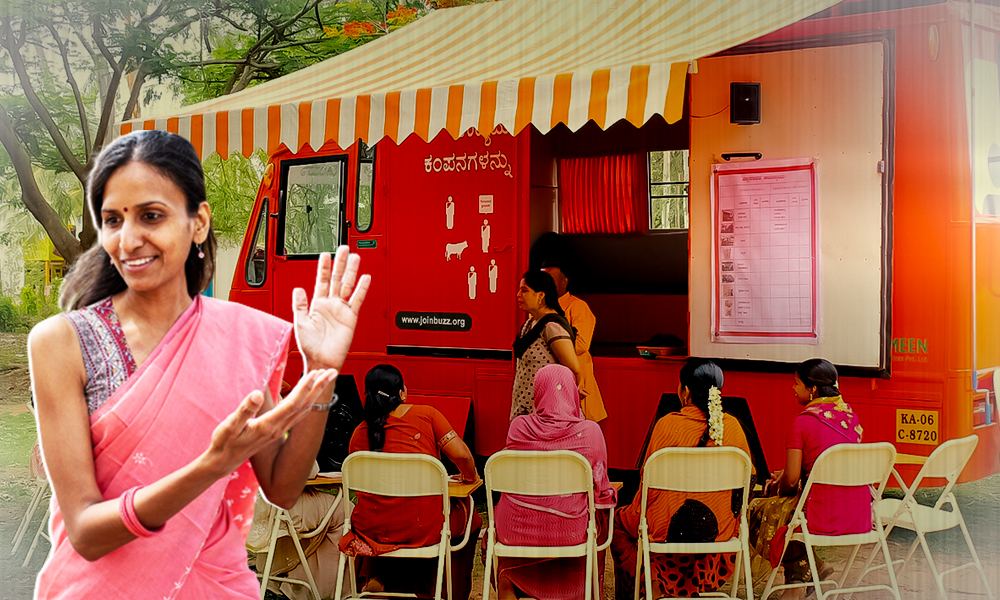
This Bangalore NGO Is Spreading Financial Literacy Among Women In Rural Areas
India, 4 Aug 2020 2:13 PM GMT | Updated 5 Aug 2020 5:52 PM GMT
Editor : Shubhendu Deshmukh |
Shubhendu, the quint essential news junky, the man who loves science and politics in equal measure and offers the complete contrast to it by being a fan of urdu poetry as well.
Creatives : Abhishek M
" An engineer by profession, Abhishek is the creative producer of the team, graphic designing is his passion and travelling his get away. In more ways than one, he makes the content visually appealing."
Situated in Bangalore, the main vision behind starting this organisation was to make women self-reliant in managing their finances.
When Uthara Narayanan first met Devamma in 2012 in her village Kyathsandra in Tumkur District, near Bangalore, Karnataka, she was debt-ridden and needed money to pay off a money lender.
Devamma's husband was an alcoholic who used to beat her every night. The abusive environment affected the tailoring job that she was doing from home. Devamma asked Uthara if she could borrow Rs 5000 from her. But Uthara was not there to give money. Instead, she provided Devamma with a six-and-half-day training on how to manage her finances, her business, how to approach problems and find solutions and in the process, discover her inner strength.
With the impact which she created in the life of Devamma, Uthara decided to start Buzz Women in 2011. Situated in Bangalore, the main vision behind starting this organisation was to make women self-reliant in managing their finances. Buzz Women's training is often a village spectacle. The Buzz bus rolls in, tents are set up, chairs are arranged, and women walk in. Most participants are low-income women who are homemakers, agricultural labourers, daily wage workers, or those who run microenterprises. Notably, Buzz trainers also come from similar socioeconomic backgrounds as these women and are intimately aware of the social context of the villages. This is what sets Buzz Women different from other organizations.
"They speak the language of the local village folk. They knew the context of the lives of the women and this helped them refer to examples from the everyday lives of the women in the training sessions. Overall, the connection between the staff and the women was admirable", says Yashodha HM, one of the trainers while speaking with The Logical Indian.
One bus facilitates the training sessions of two trainers. Each trainer includes an average of 25-30 women per batch. The Buzz intervention starts with the self-shakti training when mobile academy buses reach remote villages to deliver two-and-half-day sessions, with a week's gap in between the two sessions, on the basics of financial literacy, business and personal growth. The community anchor which they call, 'Gelathi', literally translates to a friend. She is identified by the women from among themselves. She is groomed to be able to support the learning, behavioural change and personal growth of the Buzz trained women in her community.
Nearly, 200 volunteer Community Anchors from 200 villages are brought together every month for further training and building them as a cohort. They are also equipped with further leadership training through the Spoorthi program. This ensures that they can support each other as they lead their communities from problems to solutions and local community leaders. Every month the Community Anchors also organize a monthly meeting which nudges the women towards better financial behaviour. They conduct a peer consulting session for problem-solving.
In a conversation with The Logical Indian, Uthara Narayanan shares, "If we decided to guide the women constantly, it would have been a top-down approach, something that we did not believe in. We did not want to be this external 'know-it-all' that offered advice and solutions for local problems. We wanted 'change' to be defined and owned by them. We are just the facilitators for change. Only when the solutions come from within will they be sustainable."
As change makers of financial literacy, their larger goal is to create local leaders and influencers who will build this problem-solving ability within the communities. The lack of accessibility to knowledge and skills is one of the major reasons why women have not been able to educate themselves. This creates a vicious cycle and they won't be able to become independent in attaining complete control of their finances.
The connection that develops between the Buzz trainers and the women where they come from similar backgrounds does bring a certain comfort among the women as well as among the men, many of whom stand to watch what was happening. However, there have been some cases of disruption caused by husbands of the participating women or by wayward drunk men, most of the time. When men complained about the fact that they trained only women and not them, they have to explain it to them. "We politely tell them that we believe when a woman's life changes, she'll take her family and friends along", says Uthara, Chief Changemaker at Buzz Women.
Buzz Women has solidified Uthara's belief in the power of women. There are immeasurable changes that Buzz Women has seen as and when women found their 'inner strength' or 'Self Shakti'. The entire Buzz model has been replicated in Gambia, South Africa which began operations in 2018. Although the cultural contexts were different, the impact that the Gambian women said that Buzz made on their lives was very similar to the feedback that we got from India. It has made them feel that the programme has relevance across geographies. Slowly, they also want to spread to other states of India.
"It was not an easy task for the small team, as small as three people in 2014, to mobilise women to attend the training. Buzz Women found it difficult to spread the word about training and motivate women to attend the training. There were multiple challenges. Buzz needed an entry point to the villages. While Buzz established partnerships with NGOs, the most successful partnership proved to be the one with the government." Uthara.
Through the Community Anchors, the organisation wants to build a thriving, self-sufficient and self-reliant rural and urban community ecosystem. They envision confident and financially secure women who are community influencers and decision-makers. "When that vision is achieved, we would exit the scene. This vision motivates me to keep working on this issue," concludes Uthara.
Also Read: Neurology On Wheels – The Doctor Carrying Her Services To The Villages Of India
 All section
All section














